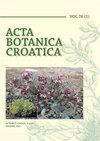Application of phytohormones as attenuators of salt stress in Tropaeolum majus L. (Tropaeolaceae)
IF 0.7
4区 生物学
Q3 PLANT SCIENCES
引用次数: 1
Abstract
The salinity of the soil and irrigation water is one of the great challenges of agriculture. Salinity can have harmful effects on physiological processes and plant growth, including Tropaeolum majus L. (Tropaeolaceae). The application of phytohormones can be a strategy to mitigate these effects. The aim of this study was to evaluate the application of jasmonic acid, salicylic acid, cytokinin and polyamine as attenuators of salt stress in T. majus. Three levels of salt stress were used: 0 mM NaCl (no stress), 50 mM NaCl (moderate stress) and 100 mM NaCl (severe stress). Four phytohormones and a control treatment were used: control (deionized water), jasmonic acid (200 µM), salicylic acid (2 mM), cytokinin (6-benzylaminopurine – 10 µM) and polyamine (spermine – 1 mM). Growth and gas exchange parameters were evaluated. Applied in conditions of moderate salt stress, all the phytohormones were efficient in improving plant height and leaf area (except salicylic acid); cytokinin and polyamine improved the number of flowers as well as gs, A and iCE; jasmonic acid improved the stem dry mass and total dry mass. In relation to severe salt stress, applications of jasmonic acid and polyamine were efficient in improving plant height; cytokinin improved leaf dry mass as well as gs, A, E, WUE, iWUE and iCE. The application of cytokinin, polyamine and jasmonic acid can be used to mitigate moderate salt stress in T. majus.植物激素在Tropaeolum majus L. (Tropaeolaceae)盐胁迫衰减剂中的应用
土壤和灌溉用水的盐度是农业面临的巨大挑战之一。盐度会对植物的生理过程和生长产生有害的影响,其中包括Tropaeolum majus L. (Tropaeolaceae)。植物激素的应用可能是减轻这些影响的一种策略。本研究旨在探讨茉莉酸、水杨酸、细胞分裂素和多胺作为盐胁迫衰减剂的应用价值。采用0 mM NaCl(无胁迫)、50 mM NaCl(中度胁迫)和100 mM NaCl(重度胁迫)三个盐胁迫水平。采用四种植物激素和对照处理:对照(去离子水)、茉莉酸(200µM)、水杨酸(2 mM)、细胞分裂素(6-苄基氨基嘌呤- 10µM)和多胺(精胺- 1 mM)。对生长和气体交换参数进行了评价。在中等盐胁迫条件下,除水杨酸外,其余激素均能有效提高植株高度和叶面积;细胞分裂素和多胺提高了花数,提高了gs、A和iCE;茉莉酸提高了茎干质量和总干质量。在重度盐胁迫下,施用茉莉酸和多胺能有效提高株高;细胞分裂素提高了叶片干质量、gs、A、E、WUE、iWUE和iCE。细胞分裂素、多胺和茉莉酸的应用可以缓解大叶参的中度盐胁迫。
本文章由计算机程序翻译,如有差异,请以英文原文为准。
求助全文
约1分钟内获得全文
求助全文
来源期刊

Acta Botanica Croatica
PLANT SCIENCES-
CiteScore
2.50
自引率
0.00%
发文量
34
审稿时长
>12 weeks
期刊介绍:
The interest of the journal is field (terrestrial and aquatic) and experimental botany (including microorganisms, plant viruses, bacteria, unicellular algae), from subcellular level to ecosystems. The attention of the Journal is aimed to the research of karstic areas of the southern Europe, karstic waters and the Adriatic Sea (Mediterranean).
 求助内容:
求助内容: 应助结果提醒方式:
应助结果提醒方式:


